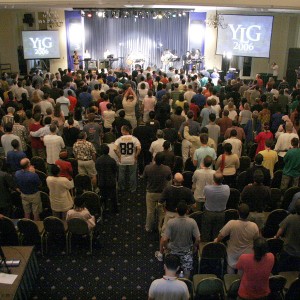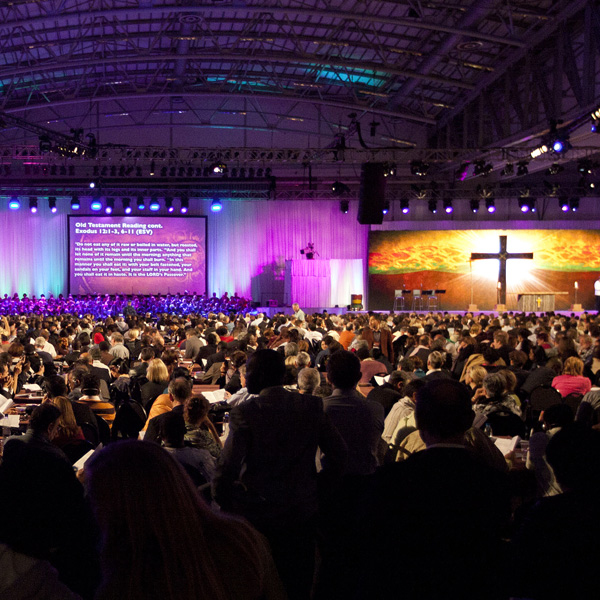During our 40th anniversary year, leading up to the leadership meeting in Vevey in May 2014, the Lausanne leadership prayerfully produced a fresh articulation of what we hope to communicate as our vision for engaging in global mission in the next 40 years.
Fourfold vision
Though our mission has not changed, we now communicate it this way: Connecting influencers and ideas for global mission. We then wrestled with what that mission looks like in reality. Or to ask it another way, if by God’s grace we were to succeed in this mission, what would the world look like? Out of that process emerged Lausanne’s fourfold vision:
Cape Town fruit
All of this is fruit from the Cape Town 2010 Congress (CT2010). The one thing that everyone involved in planning CT2010 was 100% agreed upon was this: CT2010 must not be simply another conference. The value of any gathering lies primarily in the resultant impact—the enduring worth—of the gathering. Especially in an age where technology and globalization have made it possible to ‘gather’ vast numbers of people from all over the world easily, it was essential that Cape Town bear fruit that lasted.
Now we are well on our way. The low-hanging fruit of Cape Town was the potential to collaborate on the more than 30 critical issues that were identified as crucial for the global church to engage in mission. In these five years, existing global networks have been strengthened and accelerated, and new global networks have formed around several of these issues.
Issue networks
Leaders, thinkers, and practitioners are working together to engage on topics as diverse as Islam, mission to and by the disabled, the arts in mission, and cities. They are indeed bringing Kingdom Impact in Every Sphere of Society.

In March 2015, over 300 leaders in diaspora mission gathered in Manila, Philippines, to help produce a comprehensive textbook on Diaspora Missiology. Gatherings on Islam in Ghana, Children at Risk in Ecuador, Jewish Evangelism in Jerusalem, Creation Care and Mission in Jamaica, Care and Counsel as Mission in Germany, and others have resulted in tangible strategic resources and partnerships. As always, the fruit of Lausanne grows best on others’ trees, but no one could have imagined what rich fertilizer CT2010 would prove to be!
Each of these issue networks is growing, gathering, planning, and working together in their spheres of influence so that the world might know Christ. They are all at different sizes and stages of development, but the potential is so exciting. Some of the best fruit coming from these issue networks can be seen right here in the Lausanne Global Analysis (LGA)—our bimonthly publication designed to bring seminal and timely biblical reflection and strategic analysis to evangelical leaders around the world.
Regional networks
At the same time, the Lord has allowed Lausanne to help strengthen and renew regional networks as well:
- In East Asia, house church leaders are being equipped to lead their congregations in global mission.
- In English, Portuguese, and Spanish speaking Africa, the Mission Africa Trust Fund (MATF) has been launched. MATF has described its raison d’etre like this: ‘Africa has moved from a missionary receiving continent to a missionary sending continent. The time has come for the African church to become a mission giving church.’ Can you imagine what the world will look like in ten years if abundant prayer and timely service were to cover this initiative?
- Latin America has played host to two very important gatherings in 2014—on the critical issues of Global Theological Education and of Prosperity Theology, Poverty, and the Gospel—helping chart the future course for developing Christian leaders, and addressing an errant teaching that has ravaged the church worldwide.
As regional engagement grows, so has a natural and wonderful consequence: namely, the translation of key global mission resources into more and more languages, making the fruits of CT2010 accessible to even more Christian leaders around the world. The Cape Town Commitment has been translated into at least 25 languages (and maybe more), and the LGA is being translated into several languages as well. The Lausanne Global Classroom initiative will deliver ongoing missiological education to the seven major languages of CT2010.
The longer view
This is just a taste of the fruit of CT2010. However, we are not only concerned with the low-hanging fruit that has come out of this historic gathering. Cape Town also reminded us of the desperate need to take a long view in the work of global mission.
Nearly 40 years after the first Lausanne Congress, Cape Town offered a stunning picture of the fact that global mission must be a multigenerational undertaking. Neither Billy Graham, nor the late John Stott, was at Cape Town. The young, passionate Latino leaders of 1974, Samuel Escobar and Rene Padilla, were now sharing from nearly 40 more years of experience. Alongside of this, new voices spoke into the global discussion, and perhaps the biggest shock of all is that it was a North Korean high school girl who provided the most profound moment of the entire gathering.
Next generation of leaders

Lausanne has always had an interest in seeing the next generation of mission leaders emerge. Lausanne has hosted two global (Singapore 1987, Malaysia 2006) and several regional and national Younger Leader Gatherings (YLG). However, with the generational transition in leadership apparent and under way on stage at CT2010—even two and a half years before a younger leader named Michael Oh would be appointed as Executive Director/CEO of Lausanne—it was clear that change in global mission leadership was coming. We believe that Lausanne will have a unique role in that transition: namely, to help see generation after generation of Christ-like Leaders for Every Church identified and empowered.
In 2016, in Jakarta, Indonesia, Lausanne will host the third global Younger Leaders Gathering. Some 1,000 younger leaders from more than 150 nations will gather for what, as we resolved for Cape Town, must not be simply another conference. The need for Christ-like leaders for the church is too important to be content with a week of meetings and speakers. These younger leaders will certainly hear from and engage with their more experienced counterparts, but they will also take part in creating the future that God is bringing into existence.
The participants will take part in ‘laboratories’ where their greatest passions and inspirations and the world’s greatest needs will intersect. They will receive encouragement and coaching on how to initiate the next generation of missional networks, organizations, businesses, and ministries. Historically, we have seen these eternity-shaping initiatives launched out of Lausanne gatherings (300 such networks came out of Manila 1989 alone), but this is the first time where we will actively nurture such undertakings. We are excited about the kingdom initiatives waiting to be birthed.
YLGen
Again, the need for Christ-like leaders for the church is too great simply to be content with a week of meetings and speakers. The YLG will not be the end of Lausanne’s engagement with these younger leaders. The gathering will actually launch a ten-year initiative called Younger Leaders Generation (YLGen).
Those who attend the YLG, as well as other younger leaders, will be connected in mentoring communities and receive critical mission education through Lausanne’s Global Classroom initiative. These are just two of the ongoing opportunities. It is often easy to get people excited about a big event, but there is no other Lausanne initiative that excites us as much as YLGen. We truly believe that if you want to change the world, you must change its leaders.
Wittenberg gathering—toward a greater partnership
Besides highlighting the multi-generational nature of the church, Cape Town also reminded us that global mission is too important to ignore and too difficult to do alone. Regional networks, issue networks, and generational networks are all manifestations of God’s people connecting for global mission. We want to share with you, for the first time, about an upcoming event that we ask you to pray about and fast over. It is our hope that the event results in powerful partnerships aimed at seeing the Gospel for Every Person and an Evangelical Church for Every People become a reality.
In 2017, Lausanne will be hosting a gathering in Wittenberg, Germany. That year will mark the 500th anniversary of the beginning of the Protestant Reformation. While we certainly will celebrate the faithfulness of God over these 500 years, we also understand that the gospel, the good news that Martin Luther and others worked tirelessly to defend and articulate, has yet to reach billions of men, women, and children.
The gospel the Reformers championed must continue to be heralded throughout the world. In light of this, Lausanne will be inviting 70 of the most influential mission leaders to Wittenberg to pray and plan toward a greater partnership in global mission. For more than a year before the gathering, they will be engaging in a process of prayer, discernment, reflection, and interaction.
We have much to be thankful for. However, there also remains much to do. May we continue to sense a holy, joyful urgency to engage in global mission! It is too important to ignore and too difficult to do alone. Would you pray for these networks and initiatives? Would you pray and act toward seeing this fourfold vision become a reality, for the glory of God and that the world might know Christ?



